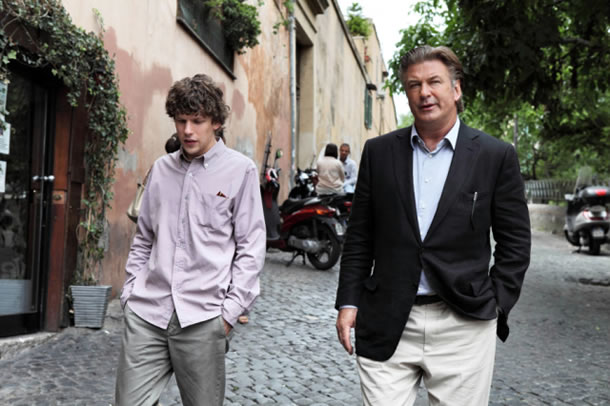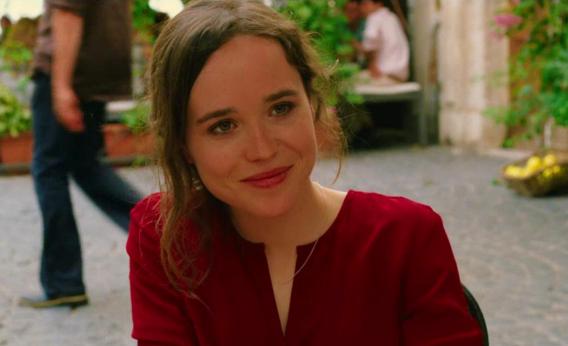|
Woody Allen's new film focuses on several couples
in Rome who are affected by culture and their personal ambitions. The
first pairing
is Hayley (Alison Pill), an American tourist engaged to Michelangelo
(Flavio
Parenti). Her parents Jerry (Woody Allen) and Phyllis (Judy Davis) fly
in to
meet Michelangelo's family, including his father Giancarlo (Fabio
Armiliato),
who is a mortician. Jerry, a former opera director, makes the discovery
that
Giancarlo is a fantastic singer, but only in the shower. In another
part of
Rome, a famous architect named John (Alec Baldwin) is looking for an
old street.
He meets Jack (Jesse Eisenberg) who invites him to where he and his
girlfriend
Sally (Greta Gerwig) are staying. John commentates on Jack's temptation
for
Sally's best friend Monica (Ellen Page), who has come to visit.
Meanwhile, office
worker Leopoldo (Roberto Benigni) wakes up one day to discover he is
famous for
no reason and is pestered about his day to day life. Lastly, Antonio
(Alessandro Tiberi) wants to impress his wealthy relatives but
accidentally becomes
separated from his wife Milly (Alessandra Mastronardi), who gets lost
looking
for a salon. When Antonio is mistakenly caught with a prostitute named
Anna
(Penelope Cruz), they have to pretend she is Milly for a day.

One of the great strengths of To Rome With
Love is that it's never
content with being funny. It's hysterical, but at age seventy-six
writer-director
Woody Allen still realises that jokes cannot exist by themselves.
Humour must
be supported by a purpose and
grounded in some form of reality. Philosophically,
Allen has said in any profession, everything a person does is for the
opposite
sex. His film reflects this by offering a deeply cynical view of the
way that
people are seduced, not just
physically, but also by a need to satisfy their self-interests, like
status and
materialism. Seduction is a broad theme, but Allen finds clever ways of
applying it to two of his favourite staples: relationships
and cultural
decline. His screenplay smartly avoids structural contrivances,
refusing to
connect the stories arbitrarily. They're told in fragments but
skilfully
bridged together in theme. The central ideas and the accompanying
staples are
always visible, meaning there's no sense of irrelevance. This structure
is also
pivotal in contributing to its own unique concept: each episode is
viewed as a microcosm of this beautiful city
(sumptuously photographed), reflecting the continually unwinding nature
of personal
stories within any place or situation. Woody's decision to magnify the
inner
lives of these characters against a larger canvas provides the film
with humour
that exists on a visual spectrum as much as a verbal one.

The film's two best threads are divided
between Woody's character and the younger talents, Page and Eisenberg.
This is
Woody's first acting role since 2006 and he doesn't miss a beat. His
token
hysterical, hypochondriac role has lost none of its charm and his
comic-timing
is impeccable. Try not to laugh when Jerry asks Giancarlo what exactly
he has
against live people or the look on
his face after they shake hands. While Woody also touches on classic
fears,
like his obsession with death, nothing prepares you for the funniest
gag
involving a bizarre stage performance. There are two microcosmic
threads at
play, which fuse theme and image seamlessly. Jerry's decision to return
to
music, after his own failings (Rigoletto, with actors dressed as white
mice we're
told), is openly questioned as being like a final grasp to enhance his
own
personal reputation. He opts to gamble heavily on the success of
Giancarlo's
magnificent but untested voice (Armiliato is a real life tenor),
continually
pressuring him into performing, even though the man has no interest in
sharing
his gift. Similarly, the stage production itself, which I won't spoil,
offers a
hugely inventive visual gag that shows how a performer's private life
is
projected into the public sphere, hilariously becoming accepted by
audiences as
a piece of high art, instead utterly ridiculous.

Meanwhile, Jessie Eisenberg's thread has a
lot in common with the Allen vehicle Play
it Again Sam (1972), using similar narrative techniques and threads
to construct
a cautionary tale about misguided passion. The thread remains coy about
whether
Jack is John's younger self. But what's
important is that one man's story leads into another. Wherever the
fatal
mistake occurred in John's life, it has led him into a fabricated
life, where he is now designing malls, instead of
something truly artistic and remains dissatisfied by his mistakes and
personal
regrets. However, the best asset of this thread is the charisma of
Ellen Page,
a gifted actress whose fast lipped verboseness finds a perfect marriage
with Allen's
dry wit. The story she tells about her experience with a woman, with
reaction
shots on Eisenberg's face, was side-splitting for me and brilliantly
executed.
Listen to the subtle irony in the
tone of the dialogue too. Monica insists that she couldn't possibly
sleep with
Jack in her best friend's house! But they
can go straight to the car instead! Or Jack mentions that he can't
breakup
with Sally because she has her exams coming up...so he'll
do it straight after! As funny as this dialogue was, I was
also heavily invested in how this thread would unfold and liked the way
that it
ended on a relatively dark note.

The other two threads are little bumpier but
still hugely entertaining and full of laughs. Benigni is restrained but
has the
least developed of the stories. It's funny to see him mobbed by the
press, but it's
intentionally repetitive, true to Woody's gripe with the banality
of journalism, focussing on boring, talentless people. The
last story is splintered in two parts, and the case of mistaken
identity is a lot
of fun, particularly with an actress as engaging and luminous as Cruz
at the
helm. The superficial nature of class is parodied wonderfully when
Antonio does
his best to hide Anna's identity, only for every man at a party to
recognise
her and make bookings. Milly's thread and her relationship with an
actor does
not receive as much time as the others, but I especially liked her
comedic dilemma,
dwelling on being unfaithful or being able to tell her grandchildren
about it
one day. All of these threads crisscross, which means that you will
have to
wait for your favourite to re-emerge. The film might not be as a
refined as Midnight in Paris (2011), it's a touch
too long, yet it has more laughs and as many complex ideas. It's a
cheerful
movie about some very strange people and one of my favourite comedies
this
year. It made me smile.
|